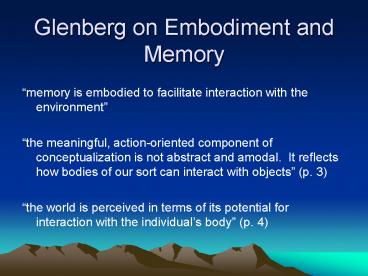Glenberg on Embodiment and Memory PowerPoint PPT Presentation
1 / 6
Title: Glenberg on Embodiment and Memory
1
Glenberg on Embodiment and Memory
- memory is embodied to facilitate interaction
with the environment - the meaningful, action-oriented component of
conceptualization is not abstract and amodal. It
reflects how bodies of our sort can interact with
objects (p. 3) - the world is perceived in terms of its potential
for interaction with the individuals body (p. 4)
2
Some Results Related to Embodiment
- --Typists prefer pairs of letters typed with
opposing fingers over pairs typed with the same
finger. Non-typists show no such preference. - --Physical rotation improves ability to locate
unseen objects. - --Hand shapes prime sensibility judgments for
phrases about actions requiring the use of those
hand shapes (pinching and dart-sentences).
3
The framework
- --projectable properties objective properties of
the environment, such as shapes of objects - --nonprojectable properties properties that
cannot be directly picked up from the environment
(ownership) - --conceptualization possible ways of acting in a
given situation, as a function of the relevant
projectable and nonprojectable properties
4
- --mesh the degree to which actions represented
by ideas can be simultaneously or sequentially
executed - --clamping attending to the projectable
properties of the current environment - --suppression ignoring projectable properties
- --trajectories series of past actions that
become natural or preferred
5
Some applications of the theoretical framework
- In planning, predicting, or anticipating, we
suppress the clamped features and follow a
natural trajectory. - The effort of suppressing the projectable
features explains the phenomenology of memory,
i.e., the way in which memory feels different
from perception. - The degree to which we understand a sentence is
determined by the meshing of ideas associated
with the component words.
6
Questions and concerns
- What is the scope of the thesis? Does it apply
to all forms of meaning, perception, and memory? - Does the thesis account for standard inferences
that are drawn from our understanding of text?
Take a theoretical claim from Glenbergs own
article. Can you reduce its meaning to a claim
about ways of interacting with the world? - Will the reduction work? Behaviorism and
phenomenalism did not do very well. How will
this work abstract ideas, such as reference or
justice?

